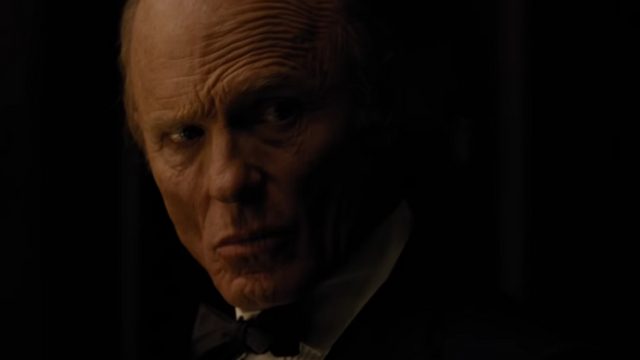SUMMARY
This is AI generated summarization, which may have errors. For context, always refer to the full article.

Robert Ford created Westworld as a way to reveal the true nature of the park’s visitors.
In “Vanishing Point” we learn that that intent is never truer than when it applies to William. This episode, the last one before the season finale, gives us the emotional crescendo (or crushing nadir?) of William’s story arc.
We’ve always known that William was a philanthropist out in the real world, and assumed that Westworld was just his playground. The dude’s a good guy; let him blow off steam in the park. Doesn’t matter if blowing off steam means blowing off heads. Dude’s a good guy.
Except William was never a good person, to begin with. ”I understood that the darkness wasn’t some mark from something I’d done; some regrettable decision I’d made,” he tells Juliet, his soon-to-be-deceased wife. “I was shedding my skin. And the darkness was what was underneath. It was mine all along.”
Westworld, with its many violent delights, didn’t really transform William into the Man in Black. The dark side was always there. The park, as Ford originally conceived it, merely revealed.
In that regard, William is the perfect case study for Westworld. The Man in Black wasn’t the character; William was the character. But the problem here is that the people hurt by the Man in Black could easily be reassembled and rebooted. The people in William’s life, not so much. Life is too fragile.
In “Vanishing Point” we get the full story about Juliet’s death. She gets drunk during an event honoring William’s philanthropic efforts. When they get home, William tucks her in bed, and assuming she was passed out, offers the most heartfelt non-apology a gruff cowboy cosplayer could offer.
“I was faithful, generous, kind… at least in this world,” he rasps, sounding eerily like Tom Waits. “But you saw through it, didn’t you? You were the only one. And for that I truly am sorry. I don’t belong to you, or this world. I belong to another world. I always have.”
During flashbacks in past episodes, we were led to believe that her death was a result of her alcoholism. This time, we get to see the complete picture. After William leaves the bedroom, Juliet opens her eyes. She heard everything. She gets up and takes the profile card (hidden between the pages of a copy of Slaughterhouse-Five) that Ford handed William earlier that evening.
The card contains a complete record of William’s personality, memories, and cognition. Juliet opens the file, which labels her husband as “Category 47B: Persecutory Subtype; Delusions; Paranoid Subtype.” And for the first time, she sees the full extent of William’s depravity. Every murder, every heinous act is included in these files. Broken beyond repair, Juliet swallows a bottle of pills and immerses herself in the bathtub. This time, she never gets up.
The show had a habit of over-extending itself when it came to teases about the Man in Black’s story. It got to the point that he had become the least interesting character in the show. But that bedroom monologue changed everything.
He’s still an utterly repugnant character, though. Back in the present timeline, we catch up with Emily and William after she rescued her father from the Ghost Nation. Not completely out of altruism, though. Emily’s main motivation was to get the whole story about her mother’s death. But William flat-out refuses to believe that Emily is a real human. He keeps insisting that she’s a Host created by Ford; a piece in their final game.
When the Delos rescue team arrives, William takes one of the men’s guns and proceeds to mow the entire team down. (How a mortally wounded senior citizen could accomplish such a feat stretches reason a bit — a classic example of Hand Wave/Unexplained Recovery tropes) Emily tries again to convince William that she is who she says she is. She even has something that belongs to him — his profile card. When Emily reaches into her pocket to retrieve it, William flips out and shoots his own daughter.
For any other character, this would have been the lowest possible point in their story. And for sure, William rides into the middle of a prairie and points his gun to his head. But as devastating this all was, it also seemed inevitable, as if William were simply fulfilling his destiny. The man was hard-coded for violence, so much so that the park almost looked like a story created just for him. Leaving a trail of death was, for better or worse (mostly worse), part of his story. This is him.
He grimaces, throws his pistol to the ground, then pulls out a knife and starts digging into his right wrist. Hosts have jacks embedded into their wrists, and we see during the earlier bedroom scene that William has a strong fixation on that part of his body. Before we learn whether William is a Host or human, the scene cuts.
The Hosts have the chance to escape the park. But for William, this park was his escape. And from the looks of it, it’ll also be his end. – Rappler.com
Add a comment
How does this make you feel?





There are no comments yet. Add your comment to start the conversation.